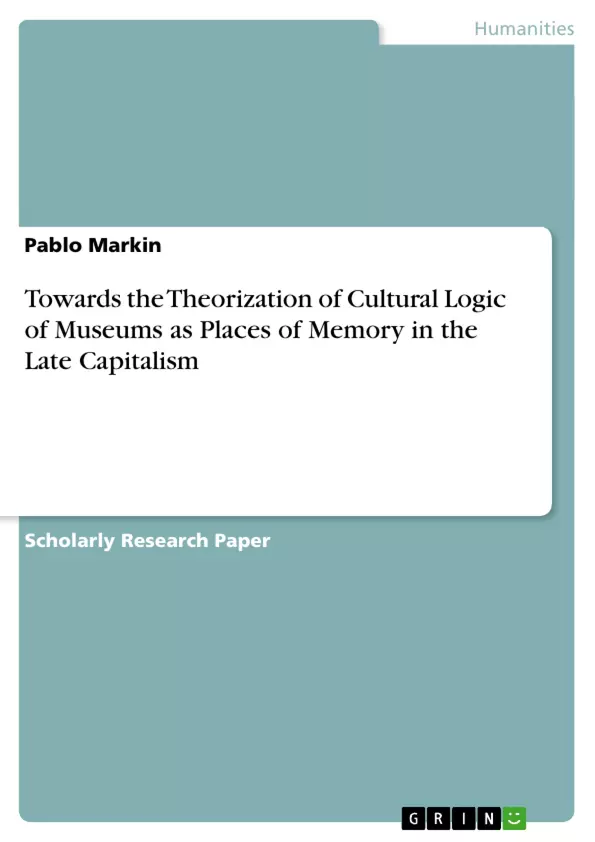The article provides tentative bridges between the condition of museums as cultural institutions undergoing transformation of their place within the urban space and the late capitalism as a globe-spanning process. The postmodern spatial relations single out museum as the site where the cultural logic of late capitalism receives its concrete expression within both the economic structures and aesthetic forms involved in it. The relation of the museum as a space where the boundaries of the aesthetic experience and expression are tested to the capitalism is not that of modeling the experience corresponding to the next stage of capitalism through its negation and revolt against it, as Krauss claims (Krauss 1990), but that of co-constitution. The late capitalist logic of production of difference as the index of economic value and the object of further investment attains its purest expression in postmodern status of the work of art whose sign-value is pure difference.
Inhaltsverzeichnis (Table of Contents)
- Abstract
- Introduction
- Postmodern Museums of Late Capitalism
- Museums as Places of Memory
- Museums as Simulated Environments
Zielsetzung und Themenschwerpunkte (Objectives and Key Themes)
This article explores the relationship between museums as cultural institutions and late capitalism. It examines how museums, within the context of postmodern spatial relations, express the cultural logic of late capitalism in both economic structures and aesthetic forms. The focus is on understanding the co-constitutive relationship between museums and capitalism, rather than viewing museums as simply reacting against or negating capitalist structures.
- The transformation of museums within the urban space of late capitalism.
- The cultural logic of late capitalism as expressed in museums.
- Museums as places of memory within the context of late capitalism.
- The role of museums in legitimizing late capitalist society.
- The relationship between postmodernism and the consumption of commodification within museums.
Zusammenfassung der Kapitel (Chapter Summaries)
Introduction: This chapter introduces Rosalind Krauss' essay on "The Cultural Logic of the Late Capitalism Museum" as a starting point for examining museums' evolving role in late capitalism. It establishes the global reach of late capitalism and highlights the centrality of Western Europe and North America in discussions of modernism and postmodernism.
Postmodern Museums of Late Capitalism: This section delves into the specifics of how the economic and aesthetic aspects of late capitalism are manifested within museums, focusing on the concept of "the consumption of sheer commodification."
Museums as Places of Memory: This chapter explores the museums' role as places of memory, linking their function to the legitimization of late capitalist society, particularly within the context of globalization, democratization, and mediatization.
Museums as Simulated Environments: [No information provided in source text]
Schlüsselwörter (Keywords)
Late capitalism, postmodernism, museums, places of memory, cultural logic, commodification, globalization, democratization, mediatization, urban space, aesthetic experience, economic structures.
Frequently Asked Questions
What is the relationship between museums and late capitalism?
The article argues that museums and late capitalism are co-constitutive. Museums express the cultural logic of late capitalism through their economic structures and aesthetic forms.
How does the "cultural logic of late capitalism" manifest in museums?
It manifests in the postmodern status of art, where sign-value is defined by pure difference, and in the museum's role as a site for the "consumption of sheer commodification."
What role do museums play as "places of memory"?
Museums serve to legitimize late capitalist society, especially in the context of globalization, mediatization, and the transformation of urban spaces.
Who is Rosalind Krauss and why is she mentioned?
Rosalind Krauss is a scholar whose essay on the cultural logic of the late capitalist museum serves as a primary starting point for the article's theoretical discussion.
How are museum spaces changing in the postmodern era?
Museums are undergoing a transformation of their place within urban spaces, becoming simulated environments that test the boundaries of aesthetic experience.
- Arbeit zitieren
- Dr Pablo Markin (Autor:in), 2006, Towards the Theorization of Cultural Logic of Museums as Places of Memory in the Late Capitalism, München, GRIN Verlag, https://www.grin.com/document/120853



